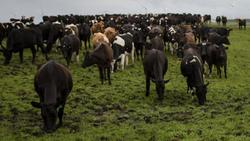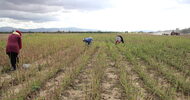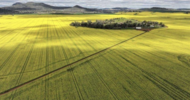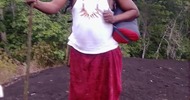The Australian | 13 October 2015
Chinese buy nation’s largest dairy, Van Diemen’s Land Company
by Sue Neales
Australia’s largest and oldest dairy farm has been effectively sold for $220 million to Chinese owners. Herman Shao-ming Hu and Kenny Zhang are finalising the purchase of a majority interest in the 190-year-old Van Diemen’s Land Company (VDL) in Tasmania.
The near-completed deal comes in the same week as federal parliament prepares to debate the Chinese-Australia free-trade agreement, and will be a test of Treasurer Scott Morrison’s attitude to foreign investment.
Mr Hu and Mr Zhang through their respective companies, Ryoden Development and the Australia-registered Waratah Corporation, will each buy about 35 per cent of VDL from current owner New Zealand’s New Plymouth Council.
The other third of Australia’s biggest single milk producer is set to be bought by the Lempriere Capital equity managers, linked to the Melbourne-based Lempriere family, noted wool traders.
The deal is one of Australia’s biggest agricultural sales to foreign investors and will require approval by the Foreign Investment Review Board as it is significantly larger than the new $15m approval threshold set earlier this year.
In 2012, the Lempriere group also organised the sale of Australia’s largest cotton farm and irrigation water holder, Cubbie Station, to another Chinese company, Shandong Ruyi, for $240m, retaining a 20 per cent stake for itself.
Hong Kong-based Mr Hu and former Howard government communications minister Richard Alston, chairman of Waratah Corporation, visited Tasmania last week to inspect the 25 dairy farms owned by VDL.
They met Premier Will Hodgman and State Growth and Energy Minister Matthew Groom.
Neither Mr Hu, who is a deputy of China’s National People’s Congress and chairman of Hong Kong’s City University, or Australian-educated mainland Chinese property developer and coal billionaire Kenny Zhang, have any previous agricultural interests.
But both Chinese companies have access to distribution and marketing channels in China and Hong Kong, where any food and farm products they produce in Australia can be sold directly.
VDL’s new Chinese owners plan to further expand and develop its farms and associated infrastructure to focus on China’s growing demand for infant baby formula and milk-based health drinks for its ageing population.
There are also suggestions the company may build its own milk powder plant to enable all its milk production, processing and distribution systems to remain within its own networks.
One of the key reasons for Mr Hu and Mr Zhang’s interest in VDL is understood to be the location of its dairy farms and the 19,000ha of land it owns in remote Tasmania.
They believe foods grown and produced from Tasmania, and potentially marketed under a special new brand highlighting VDL’s centrepiece station Woolnorth as the location of the world’s cleanest air and water at Cape Grim, will sell particularly well in China.
VDL runs a massive herd of 29,000 dairy cattle on a combined 19,000ha of fertile farmland in northern Tasmanian.
Its 18,000 milking cows, most located on Woolnorth station on the state’s isolated northwest tip, as well as 12 other farms, produce more than 100 million litres of milk a year, making the VDL company Australia’s largest single milk supplier.
The Bureau of Meteorology also has an air-testing station at Cape Grim, while VDL’s Woolnorth farm is already home to 62 wind turbines, majority-owned by another Chinese company, the Shenhua Energy Group
Mr Zheng, managing director of Waratah Corporation which started life as his first business Waratah Paint, earlier this year flagged his move out of investment in the slowing mining and resources sector into agribusiness in Australia and New Zealand.
“With the domestic food safety problem becoming more and more serious, most Chinese are paying more attention to safety and healthy food,” Mr Zheng wrote in a recent message on his company website.
The Tasmanian government, which did not respond to requests for comment yesterday, is understood to be thrilled by the Chinese interest — and much-needed foreign capital — into Australia’s smallest and poorest state and its booming dairy industry.
There are also hopes other Chinese investors may now invest in Tasmania’s ageing container port at Launceston or at Burnie — as well as in direct shipping services between Tasmania and China.
None of the companies involved in the sale would comment yesterday.
The company has been informally on the market for the past three years, with potential Chinese investors always prominent in talks.
Sources told The Australian that, while formal purchase papers had not been signed, contracts were well advanced and would proceed to signing ahead of FIRB approval within days.
Lempriere Capital’s purchase of one-third of Tasmania’s biggest dairy operation marks a nostalgic return to its roots.
Its heritage goes back to 1823, when Tasmanian woolgrower and trader Thomas Lempriere founded the Bank of Van Diemen’s Land, Australia’s second bank.
Chinese buy nation’s largest dairy, Van Diemen’s Land Company
by Sue Neales
Australia’s largest and oldest dairy farm has been effectively sold for $220 million to Chinese owners. Herman Shao-ming Hu and Kenny Zhang are finalising the purchase of a majority interest in the 190-year-old Van Diemen’s Land Company (VDL) in Tasmania.
The near-completed deal comes in the same week as federal parliament prepares to debate the Chinese-Australia free-trade agreement, and will be a test of Treasurer Scott Morrison’s attitude to foreign investment.
Mr Hu and Mr Zhang through their respective companies, Ryoden Development and the Australia-registered Waratah Corporation, will each buy about 35 per cent of VDL from current owner New Zealand’s New Plymouth Council.
The other third of Australia’s biggest single milk producer is set to be bought by the Lempriere Capital equity managers, linked to the Melbourne-based Lempriere family, noted wool traders.
The deal is one of Australia’s biggest agricultural sales to foreign investors and will require approval by the Foreign Investment Review Board as it is significantly larger than the new $15m approval threshold set earlier this year.
In 2012, the Lempriere group also organised the sale of Australia’s largest cotton farm and irrigation water holder, Cubbie Station, to another Chinese company, Shandong Ruyi, for $240m, retaining a 20 per cent stake for itself.
Hong Kong-based Mr Hu and former Howard government communications minister Richard Alston, chairman of Waratah Corporation, visited Tasmania last week to inspect the 25 dairy farms owned by VDL.
They met Premier Will Hodgman and State Growth and Energy Minister Matthew Groom.
Neither Mr Hu, who is a deputy of China’s National People’s Congress and chairman of Hong Kong’s City University, or Australian-educated mainland Chinese property developer and coal billionaire Kenny Zhang, have any previous agricultural interests.
But both Chinese companies have access to distribution and marketing channels in China and Hong Kong, where any food and farm products they produce in Australia can be sold directly.
VDL’s new Chinese owners plan to further expand and develop its farms and associated infrastructure to focus on China’s growing demand for infant baby formula and milk-based health drinks for its ageing population.
There are also suggestions the company may build its own milk powder plant to enable all its milk production, processing and distribution systems to remain within its own networks.
One of the key reasons for Mr Hu and Mr Zhang’s interest in VDL is understood to be the location of its dairy farms and the 19,000ha of land it owns in remote Tasmania.
They believe foods grown and produced from Tasmania, and potentially marketed under a special new brand highlighting VDL’s centrepiece station Woolnorth as the location of the world’s cleanest air and water at Cape Grim, will sell particularly well in China.
VDL runs a massive herd of 29,000 dairy cattle on a combined 19,000ha of fertile farmland in northern Tasmanian.
Its 18,000 milking cows, most located on Woolnorth station on the state’s isolated northwest tip, as well as 12 other farms, produce more than 100 million litres of milk a year, making the VDL company Australia’s largest single milk supplier.
The Bureau of Meteorology also has an air-testing station at Cape Grim, while VDL’s Woolnorth farm is already home to 62 wind turbines, majority-owned by another Chinese company, the Shenhua Energy Group
Mr Zheng, managing director of Waratah Corporation which started life as his first business Waratah Paint, earlier this year flagged his move out of investment in the slowing mining and resources sector into agribusiness in Australia and New Zealand.
“With the domestic food safety problem becoming more and more serious, most Chinese are paying more attention to safety and healthy food,” Mr Zheng wrote in a recent message on his company website.
The Tasmanian government, which did not respond to requests for comment yesterday, is understood to be thrilled by the Chinese interest — and much-needed foreign capital — into Australia’s smallest and poorest state and its booming dairy industry.
There are also hopes other Chinese investors may now invest in Tasmania’s ageing container port at Launceston or at Burnie — as well as in direct shipping services between Tasmania and China.
None of the companies involved in the sale would comment yesterday.
The company has been informally on the market for the past three years, with potential Chinese investors always prominent in talks.
Sources told The Australian that, while formal purchase papers had not been signed, contracts were well advanced and would proceed to signing ahead of FIRB approval within days.
Lempriere Capital’s purchase of one-third of Tasmania’s biggest dairy operation marks a nostalgic return to its roots.
Its heritage goes back to 1823, when Tasmanian woolgrower and trader Thomas Lempriere founded the Bank of Van Diemen’s Land, Australia’s second bank.















